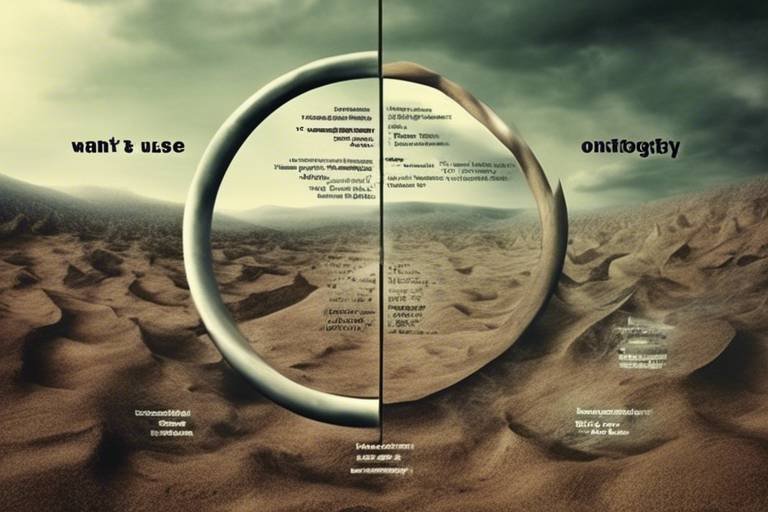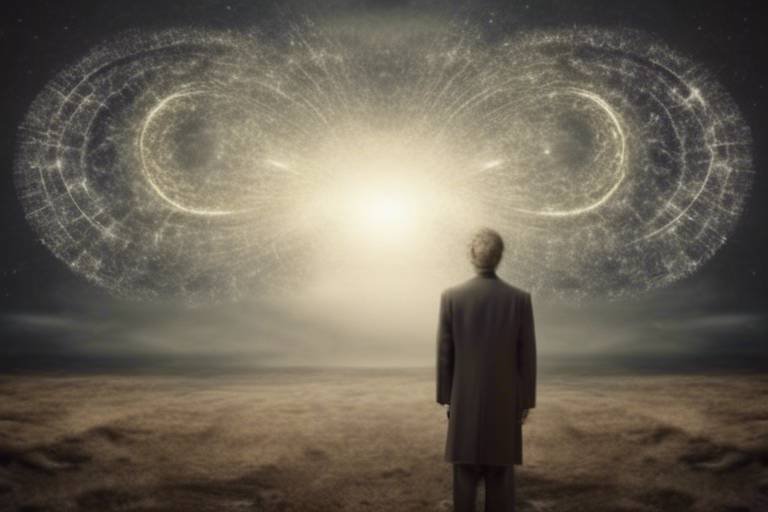Metaphysics - Investigating the Metaphysical Principle of Causality
Causality is a fundamental concept that permeates both our everyday lives and the grand tapestry of philosophical inquiry. It’s the idea that every effect has a cause, creating a chain of events that shapes our reality. But have you ever paused to consider just how deep this principle runs? In metaphysics, causality isn't just a dry academic concept; it’s a lens through which we can explore the very fabric of existence. It challenges us to ask profound questions: What does it mean for something to exist? How do our actions ripple through time and space? In this article, we will embark on a journey to uncover the layers of causality, tracing its historical roots and examining its implications in both philosophical and scientific contexts.
Causality, at its core, refers to the relationship between causes and effects. Imagine a row of dominoes; when one falls, it inevitably knocks the next one over, leading to a cascading effect. This simple illustration encapsulates the essence of causality. In philosophical terms, causality is often viewed as a necessary connection between events, where one event (the cause) brings about another event (the effect). In the realm of science, causality takes on a more empirical flavor, relying on observation and experimentation to establish relationships between variables. This dual perspective—philosophical and scientific—invites us to explore how causality not only explains phenomena but also influences our understanding of reality itself.
Throughout history, the concept of causality has evolved, shaped by the insights of various philosophers. From ancient Greece to the modern era, thinkers have grappled with the intricacies of cause and effect, leading to a rich tapestry of theories. Key figures in this philosophical journey include:
- Aristotle: Introduced the idea of four causes, laying the groundwork for future discussions.
- David Hume: Questioned the reliability of causal inference, emphasizing the role of human perception.
- Immanuel Kant: Proposed that causality is a fundamental category of human thought, shaping our understanding of experience.
This historical perspective not only highlights the evolution of thought surrounding causality but also underscores its significance in metaphysical discussions. Each philosopher added a unique thread to the fabric of our understanding, creating a complex interplay of ideas that continue to resonate today.
One of the most influential contributions to the understanding of causality comes from Aristotle, who articulated a framework consisting of four distinct types of causes: material, formal, efficient, and final. Each of these causes offers a different lens through which to examine the origins of an object or event, ultimately enriching our comprehension of causality. Let’s break them down:
The material cause refers to the substance from which something is made. For instance, consider a wooden table; its material cause would be the wood itself. Understanding the material cause is crucial because it helps us grasp the physical properties of objects and their existence in the world. Without the material cause, we would be left with abstract concepts devoid of tangible reality.
On the other hand, the formal cause pertains to the form or essence of an object. It’s the blueprint or design that gives an object its identity. In our wooden table example, the formal cause would be the design that defines it as a table rather than a chair or a sculpture. This distinction is vital for our perception of identity and existence, as it influences how we categorize and understand the world around us.
Fast forward to the 18th century, and we encounter Immanuel Kant, who challenged traditional notions of causality. Kant argued that our understanding of causality is not merely derived from observation but is instead shaped by innate structures of the mind. This revolutionary idea suggests that causality is a fundamental category through which we interpret our experiences. In doing so, Kant opened up a new avenue for metaphysical discussions, prompting us to consider how our cognitive frameworks influence our understanding of reality.
In contemporary discourse, causality remains a critical component of scientific inquiry. Scientists utilize rigorous methods to establish causal relationships, often employing statistical techniques and experimental designs. This modern approach to causality emphasizes the importance of evidence and reproducibility, setting a high standard for claims about cause and effect. Yet, the implications of these methods extend beyond the laboratory, challenging us to reevaluate our philosophical assumptions about the nature of reality.
One of the most fascinating developments in modern science is the emergence of quantum mechanics, which introduces complexities to our traditional understanding of causality. In the quantum realm, particles can exist in multiple states simultaneously, and their behavior can seem to defy classical notions of cause and effect. This challenges the deterministic view that every effect must have a specific cause, prompting metaphysicians to reconsider the implications for our understanding of existence and reality.
The debate between determinism and free will is intricately tied to the principle of causality. Determinists argue that every action is the result of preceding causes, suggesting that free will is an illusion. Conversely, proponents of free will contend that individuals possess the agency to make choices independent of prior causes. This philosophical tug-of-war raises essential questions about moral responsibility and the nature of human existence, making causality a pivotal point of contention in metaphysical discussions.
Understanding causality has practical implications that extend into various fields, including ethics and epistemology. In ethics, for instance, causality influences our perceptions of moral responsibility. When we consider the consequences of our actions, we often reflect on the causal relationships that led to those outcomes. In epistemology, the acquisition of knowledge frequently relies on causal relationships, as we seek to understand how beliefs are formed and justified. Thus, the metaphysical principles of causality inform our understanding of truth, belief, and moral accountability.
When we think about morality, causality plays a crucial role in shaping our views on accountability and ethical decision-making. If we believe that our actions have consequences, then understanding the causal relationships involved becomes vital. For example, if someone causes harm to another, we naturally want to understand the chain of events that led to that outcome. This understanding informs our judgments about moral responsibility and justice.
Similarly, the acquisition of knowledge often hinges on causal relationships. When we learn something new, we typically trace back the causes that led us to that knowledge. This exploration of causality underpins many epistemological theories, helping us decipher the nature of truth and belief. Without a clear understanding of causality, our grasp of knowledge would be tenuous at best.
What is causality in metaphysics?
Causality in metaphysics refers to the relationship between causes and effects, exploring how events are interconnected and influence one another.
Who were the key philosophers associated with causality?
Key philosophers include Aristotle, who introduced the concept of four causes, and Kant, who challenged traditional views by suggesting that causality is a fundamental category of human thought.
How does modern science approach causality?
Modern science approaches causality through empirical methods, utilizing statistical techniques and experimental designs to establish causal relationships.
What is the significance of causality in ethics?
Causality is significant in ethics as it influences our understanding of moral responsibility and the consequences of our actions.

The Nature of Causality
Causality is a fundamental concept that describes the relationship between causes and effects. It’s like the invisible thread that weaves through the fabric of reality, connecting events in a way that makes sense of our experiences. Imagine throwing a stone into a still pond; the moment the stone hits the water, it creates ripples that spread outward. This simple act illustrates causality: the stone (the cause) leads to the ripples (the effect). But what does this mean in a broader context? In both philosophical and scientific discussions, causality is not just a matter of sequential events; it’s about understanding the underlying principles that govern why things happen the way they do.
In philosophy, causality often raises questions about the nature of reality itself. Is everything predetermined, or do we have the power to influence outcomes? This dichotomy between determinism and free will is deeply rooted in our understanding of causality. Philosophers like Hume and Kant have explored these ideas, suggesting that our perception of cause and effect may be shaped more by our mental frameworks than by the external world. For instance, Kant argued that causality is a category of our understanding, meaning that we impose this structure on our experiences rather than discovering it in the world itself.
From a scientific perspective, causality is equally crucial. In the realm of physics, for example, the laws of motion and energy conservation are built upon causal relationships. When we conduct experiments, we observe how changing one variable affects another, helping us to formulate theories and predict outcomes. However, the introduction of quantum mechanics has complicated these traditional views. In the quantum realm, particles can behave in ways that seem to defy classical causality, leading to discussions about randomness and uncertainty. These complexities challenge our conventional understanding and prompt us to rethink what we know about causation.
Ultimately, the nature of causality is a rich and multifaceted topic that spans various disciplines. Whether we’re examining it through a philosophical lens or a scientific one, it invites us to ponder profound questions about existence, agency, and the interconnectedness of all things. The exploration of causality not only enhances our comprehension of the universe but also shapes our moral frameworks and epistemological theories. As we continue to investigate these relationships, we uncover deeper insights into the very essence of reality.

Historical Perspectives on Causality
The exploration of causality has captivated thinkers for centuries, leading to a rich tapestry of ideas that have shaped our understanding of reality. From ancient philosophers to modern scientists, the evolution of thought around causality reveals how deeply intertwined it is with our perception of existence. Each era has contributed unique insights, reflecting the cultural and intellectual currents of the time. Let's take a closer look at some pivotal figures and their contributions that have significantly influenced the discourse on causality.
In ancient Greece, Aristotle emerged as a foundational figure in the study of causality. His notion of the four causes—material, formal, efficient, and final—provided a comprehensive framework for understanding how and why things happen. Aristotle argued that to truly grasp an event, one must consider not just the immediate cause but also the essence and purpose behind it. This multifaceted approach laid the groundwork for future philosophical inquiries into causation.
Fast forward to the Enlightenment, and we encounter Immanuel Kant, who radically challenged traditional views on causality. Kant proposed that our understanding of cause and effect is not merely a reflection of external reality but is shaped by the innate structures of the human mind. He argued that we cannot know things as they are in themselves, but only as they appear to us through our perceptual frameworks. This revolutionary idea shifted the focus from objective reality to the subjective experiences that inform our understanding of causality.
As we moved into the 19th and 20th centuries, the scientific revolution brought about a new wave of thinking. The development of Newtonian physics established a more mechanistic view of causality, where every effect had a specific cause that could be quantified and predicted. This era marked a significant shift, as causal relationships began to be understood in terms of physical laws and mathematical precision. However, this perspective faced challenges with the advent of quantum mechanics, which introduced uncertainties that defied classical causal explanations.
To better illustrate the evolution of thought on causality, consider the following timeline:
| Philosopher/Scientist | Era | Key Contribution |
|---|---|---|
| Aristotle | 384-322 BC | Four Causes: material, formal, efficient, final |
| David Hume | 1711-1776 | Empirical skepticism about causation and induction |
| Immanuel Kant | 1724-1804 | Subjective interpretation of causality through human perception |
| Isaac Newton | 1643-1727 | Mechanistic view of causality in classical physics |
| Albert Einstein | 1879-1955 | Relativity and its implications for causality |
| Quantum Physicists | 20th Century | Challenged classical causality with uncertainty principles |
As we can see, the discourse surrounding causality is not static; it evolves with our understanding of the universe and ourselves. Each thinker has added layers of complexity to the concept, highlighting the multifaceted nature of cause and effect. This historical perspective not only enriches our comprehension of causality but also invites us to ponder profound questions about existence, responsibility, and the very fabric of reality.
In conclusion, the historical perspectives on causality reveal a dynamic interplay between philosophical thought and scientific inquiry. By examining the contributions of key figures, we gain valuable insights into how our understanding of causation has transformed over time, ultimately shaping our approach to metaphysical questions about existence and reality.
- What is causality? Causality refers to the relationship between causes and their effects, explaining how one event leads to another.
- Who were the key philosophers in the study of causality? Key philosophers include Aristotle, David Hume, and Immanuel Kant, each contributing unique perspectives on the nature of causation.
- How has modern science influenced our understanding of causality? Modern science, particularly through physics, has introduced both deterministic and probabilistic views of causality, challenging traditional notions.
- What role does causality play in ethics? Causality is crucial in ethics as it informs our understanding of moral responsibility and the consequences of actions.

Aristotle's Causation
When we dive into the realm of causation as articulated by Aristotle, we find ourselves at the heart of a philosophical framework that has influenced countless thinkers throughout history. Aristotle proposed a comprehensive system of understanding causality through what he termed the "four causes." These four distinct types of causes help to explain not just the how of things coming into existence, but also the why they are the way they are. By dissecting the essence of causality, Aristotle provides us with a lens through which we can better grasp the nature of reality itself.
Let's break down these four causes, as they are crucial for understanding Aristotle's perspective:
- Material Cause: This refers to the substance or matter from which a thing is made. For example, the material cause of a wooden table is the wood itself. Without the wood, there would be no table.
- Formal Cause: This pertains to the form or essence of a thing. It answers the question, "What is it?" For instance, the formal cause of the table is its design or structure, which gives it its identity as a table.
- Efficient Cause: This cause relates to the agent or force that brings something into being. In our table example, the efficient cause would be the carpenter who crafted the table.
- Final Cause: This is perhaps the most intriguing of the four, as it deals with the purpose or end for which a thing exists. The final cause of the table is to provide a surface for dining, working, or other activities.
Understanding these four causes not only enriches our comprehension of individual objects but also allows us to see the interconnectedness of events and phenomena in the world around us. For Aristotle, causation is not merely a linear sequence of events; rather, it is a complex web of relationships that defines existence itself. Each cause plays a pivotal role in shaping the reality we experience, and together they form a holistic view of causality.
Furthermore, Aristotle's insights into causation extend beyond mere philosophical discourse; they have practical implications in various fields such as science, ethics, and even art. By applying this framework, we can analyze situations more deeply, exploring the underlying factors that contribute to outcomes. This approach encourages critical thinking and a more nuanced understanding of the world, prompting us to ask questions like, "What are the material, formal, efficient, and final causes at play in this scenario?"
In conclusion, Aristotle's exploration of causation offers us a rich tapestry of ideas that continue to resonate today. His four causes provide a robust structure for understanding not just the physical world, but also the philosophical implications of our existence. As we navigate through life, recognizing these causes can lead us to a deeper appreciation of the intricate dance of cause and effect that shapes our reality.
- What are Aristotle's four causes?
Aristotle's four causes are: Material Cause, Formal Cause, Efficient Cause, and Final Cause. Each cause plays a crucial role in explaining why things exist as they do. - How does Aristotle's view of causation differ from modern science?
While Aristotle's causation includes purpose (Final Cause), modern science often focuses on efficient causes and observable phenomena, sometimes sidelining the concept of purpose. - Why is understanding causation important?
Understanding causation helps us comprehend the relationships between events and phenomena, leading to better decision-making in various aspects of life.

Material Cause
The concept of is fundamental in understanding the essence of objects and their existence. It refers to the physical substance or matter that composes something. Imagine a sculptor chiseling away at a block of marble; the marble itself is the material cause of the statue that emerges. Without that specific material, the statue could not exist in its current form. This idea leads us to ponder: what is the significance of material cause in our everyday lives and in the broader context of metaphysical inquiry?
In the realm of metaphysics, the material cause provides a tangible basis for understanding the world around us. It prompts us to ask questions about the nature of existence: What are things made of? How does their composition influence their properties and behaviors? For instance, consider a wooden chair. Its material cause is the wood, which determines not only its physical characteristics—like weight and durability—but also its aesthetic appeal. The choice of material can drastically change how we perceive and interact with an object. This highlights an important aspect of material cause: it is not just about what something is made of, but also about how that material shapes our experience of it.
Moreover, the material cause is intertwined with the concept of change. When we think about the transformation of an object, we often consider how its material components can alter. For example, when wood is exposed to fire, it can turn into ash, demonstrating that the material cause is not static; it can evolve and affect the identity of an object. This leads us to reflect on the broader implications of material cause in metaphysics. It raises questions about permanence and impermanence: Are objects defined solely by their material makeup, or do they possess an essence that transcends their physical components?
To illustrate the importance of material cause in different contexts, let's consider a table that outlines various examples:
| Object | Material Cause | Significance |
|---|---|---|
| Statue | Marble | Represents artistic expression and permanence |
| Wooden Chair | Wood | Indicates comfort, utility, and aesthetics |
| Glass Vase | Glass | Symbolizes fragility and beauty |
In summary, the material cause is not merely a philosophical abstraction; it plays a crucial role in our understanding of reality. By examining the substance that makes up objects, we gain insights into their nature, purpose, and the relationships we form with them. This exploration of material cause invites us to consider the deeper meanings behind what we encounter in our lives, urging us to appreciate the intricate connections between matter and existence.
- What is material cause? Material cause refers to the physical substance that constitutes an object, influencing its properties and identity.
- How does material cause relate to change? Material cause can evolve, affecting the identity of an object; for example, wood can turn to ash when burned.
- Why is material cause important in metaphysics? It helps us understand the essence of objects, prompting questions about existence, change, and identity.

Formal Cause
The concept of , as introduced by Aristotle, is pivotal in understanding not just what things are made of, but more importantly, what they fundamentally are. Imagine a sculptor chiseling away at a block of marble. The marble itself represents the material cause, but the vision in the sculptor's mind, the shape that the final piece is intended to take—this is the formal cause. It is the essence or blueprint that defines the identity of an object. Without this guiding form, the marble would remain just a block, devoid of any specific identity or purpose.
In essence, the formal cause is about the structure and design that give rise to the properties of an object. It answers questions like: "What is it?" and "What is its purpose?" For instance, if we consider a chair, its formal cause is not just the wood or metal it is made from, but the design that allows it to serve the function of seating. This design encompasses everything from its shape to its ergonomics, illustrating how the formal cause is integral to understanding the object's role in our lives.
Aristotle argued that to fully grasp an object, one must consider all four causes—material, formal, efficient, and final. However, the formal cause often serves as the most enlightening when it comes to understanding identity. It bridges the gap between mere existence and functional existence. To illustrate this further, let’s look at a simple table:
| Object | Material Cause | Formal Cause | Efficient Cause | Final Cause |
|---|---|---|---|---|
| Table | Wood | Rectangular shape for dining | Carpenter's craftsmanship | To provide a surface for eating |
| Statue | Marble | Human figure | Artist's skill | To honor a historical figure |
This table illustrates how the formal cause provides clarity about the object's identity and purpose. It is not just about what something is made of (material cause), but what it represents and how it functions within a broader context. Thus, the formal cause plays a crucial role in metaphysics, as it invites us to look beyond the surface and consider the deeper implications of existence.
In contemporary discussions, the idea of formal cause also extends into various fields, including art, architecture, and even technology. For instance, in software design, the formal cause can be compared to the architecture of a program—the underlying structure that dictates how it will function and serve its users. Understanding this helps developers create more effective and user-friendly applications.
In conclusion, the formal cause is not merely an abstract philosophical notion; it is a vital principle that shapes our understanding of the world around us. By recognizing the significance of form and design, we can appreciate the intricate connections between objects, their functions, and their roles in our lives.
- What is formal cause? - It refers to the essence or design of an object that defines its identity and purpose.
- How does formal cause differ from material cause? - Material cause is about what something is made of, while formal cause is about its structure and intended function.
- Can formal cause apply to modern technology? - Yes, in areas like software design, the formal cause relates to the architecture and functionality of applications.

Kant's Critique of Causality
Immanuel Kant, a towering figure in philosophy, shook the foundations of metaphysics with his radical critique of causality. He argued that our understanding of cause and effect is not merely a reflection of the external world but is significantly shaped by the innate structures of our own minds. Kant proposed that we do not perceive causality as it exists independently; rather, we impose our cognitive frameworks onto our experiences. This leads us to ask: Are we truly grasping the nature of reality, or are we merely interpreting it through a lens crafted by our mental faculties?
Kant's ideas can be encapsulated in his assertion that causality is a synthetic a priori concept. This means that while we cannot derive the concept of causation from experience alone, it is still essential for making sense of our experiences. In simpler terms, causality is a prerequisite for understanding the sequence of events in our lives. Without it, the world would be a chaotic jumble of occurrences without any logical order. Kant's perspective suggests that our minds are like a pair of glasses, filtering and structuring the raw data of the world into a coherent narrative.
To illustrate this, consider the following key points of Kant's critique:
- Innate Structures: Kant believed that our understanding of causality arises from the innate structures of the mind, which actively shape our perception of reality.
- Phenomena vs. Noumena: Kant distinguished between the world as we perceive it (phenomena) and the world as it exists independently of our perceptions (noumena). Causality applies only to the former.
- Transcendental Idealism: His philosophy posits that knowledge is limited to what can be experienced, with causality being a necessary condition for any empirical observation.
This critique has profound implications for metaphysical discussions. If causality is not an inherent property of the world but rather a construct of our minds, then the traditional understanding of cause and effect comes into question. How do we reconcile this with scientific inquiry, which often relies on causal relationships to explain phenomena? Kant's challenge invites us to reconsider the very nature of knowledge and existence. Are we simply observers in a predetermined universe, or do our perceptions actively shape reality itself?
In conclusion, Kant's critique of causality serves as a critical turning point in metaphysical thought. It compels us to reflect on the limitations of human knowledge and the role our minds play in interpreting the world around us. By recognizing that causality is not merely an external truth but a framework through which we view our experiences, we open the door to deeper philosophical inquiries about existence, reality, and the nature of the universe.
- What is Kant's main argument against traditional causality?
Kant argues that causality is not an inherent characteristic of the external world but rather a construct of our minds that helps us make sense of our experiences. - How does Kant differentiate between phenomena and noumena?
Phenomena are the world as we perceive it, while noumena are the things-in-themselves, which exist independently of our perceptions. - What is the significance of causality in understanding knowledge?
Causality is essential for organizing our experiences, allowing us to form coherent knowledge about the world.

Modern Causality in Science
The concept of causality has taken on new dimensions in the realm of modern science, evolving from the classical notions that have dominated philosophical discourse for centuries. Today, causality is not just a philosophical inquiry; it is a fundamental principle guiding scientific investigation and understanding. In the contemporary scientific landscape, the relationship between cause and effect is scrutinized through rigorous methodologies and experimental validation, reshaping our comprehension of reality.
One of the most significant shifts in understanding causality comes from the field of quantum mechanics. Unlike classical physics, where causality appears linear and predictable, quantum mechanics introduces a level of unpredictability that challenges traditional views. For instance, particles can exist in multiple states simultaneously until observed, leading to the famous notion of superposition. This phenomenon raises questions about whether causality operates differently at the quantum level compared to the macroscopic world we experience daily.
Moreover, the implications of quantum mechanics extend to the philosophical debate surrounding determinism and free will. If quantum events are fundamentally indeterminate, what does that mean for our understanding of causation in human behavior? Are our choices merely the result of a complex web of causal relationships, or is there room for genuine free will? These questions highlight the intricate dance between science and philosophy, where each discipline informs and challenges the other.
Furthermore, the scientific method itself relies heavily on the principle of causality. Researchers formulate hypotheses based on observed phenomena, seeking to establish causal relationships through controlled experiments. This process often involves:
- Identifying variables and their interactions
- Establishing correlations
- Testing predictions through experimentation
- Analyzing results to determine causal links
For example, in the field of medicine, understanding the causative agents of diseases is crucial for developing effective treatments. Researchers investigate how various factors—such as genetics, environmental influences, and lifestyle choices—interact to cause health outcomes. This causal analysis not only enhances our understanding of diseases but also informs public health policies and interventions.
In addition to quantum mechanics and medical research, the exploration of causality extends into other scientific domains, such as psychology and economics. In psychology, understanding the causal factors behind human behavior can lead to better therapeutic approaches. Similarly, economists analyze causal relationships within markets to predict trends and inform policy decisions. These applications underscore the pervasive influence of causality across various scientific fields, shaping our understanding of complex systems.
As we delve deeper into the mysteries of the universe, the exploration of causality continues to evolve. The interplay between scientific inquiry and metaphysical considerations invites us to rethink our assumptions about reality. Are we merely observers of a predetermined universe, or do we wield the power to influence outcomes through our actions? The answers to these questions remain elusive, yet they fuel the ongoing quest for knowledge and understanding.
- What is causality in science? Causality in science refers to the relationship between causes and effects, where one event (the cause) leads to the occurrence of another event (the effect).
- How does quantum mechanics challenge traditional notions of causality? Quantum mechanics introduces unpredictability and non-linearity, suggesting that at the quantum level, events can occur without clear causal relationships.
- Why is understanding causality important in medicine? Understanding causality helps identify the causes of diseases, leading to more effective treatments and public health strategies.
- How do psychologists use causality? Psychologists analyze causal relationships to understand behaviors and mental processes, which can inform therapeutic practices.

Quantum Mechanics and Causality
Quantum mechanics, the branch of physics that deals with the subatomic world, has revolutionized our understanding of causality. Unlike classical physics, where causality follows a predictable and linear path, quantum mechanics introduces a level of uncertainty and complexity that challenges our traditional notions of cause and effect. Imagine a world where particles can be in multiple states at once, only to 'decide' on a specific state when observed. This phenomenon, known as superposition, raises profound questions about the nature of reality and the role of the observer in the causal chain.
At the heart of quantum mechanics lies the famous Heisenberg Uncertainty Principle, which posits that certain pairs of physical properties, like position and momentum, cannot be simultaneously known with arbitrary precision. This uncertainty implies that, at the quantum level, causality is not as straightforward as it is in classical mechanics. Instead of a clear cause leading to a specific effect, we find a web of probabilities and potentialities. This leads us to ponder: if we cannot predict outcomes with certainty, how do we define causality in this context?
One of the most intriguing implications of quantum mechanics is the concept of quantum entanglement. When two particles become entangled, the state of one particle is directly related to the state of another, regardless of the distance separating them. This phenomenon seems to defy the classical idea of causality, where an effect must have a cause that is spatially and temporally linked to it. Instead, entangled particles exhibit correlations that suggest a deeper, non-local connection. It's as if they are communicating instantaneously, challenging our understanding of how cause and effect operate across space and time.
To further illustrate the complexities of causality in quantum mechanics, consider the following table that summarizes some of the key differences between classical and quantum causality:
| Aspect | Classical Causality | Quantum Causality |
|---|---|---|
| Predictability | Deterministic | Probabilistic |
| Nature of Events | Linear and Sequential | Non-linear and Simultaneous |
| Observer Effect | Minimal | Significant |
| Entanglement | Not Applicable | Present |
As we delve deeper into the philosophical implications of quantum mechanics, we encounter a fascinating debate about determinism versus free will. If quantum events are fundamentally probabilistic, does this mean that our actions are also subject to the same uncertainties? Are we merely players in a game governed by chance, or do we still retain some control over our destinies? This question not only challenges our understanding of causality but also our perception of moral responsibility and human agency.
In conclusion, quantum mechanics has transformed our understanding of causality from a straightforward, linear relationship to a complex interplay of probabilities and interconnectedness. As we continue to explore the quantum realm, we must grapple with these challenges and reconsider what it truly means to cause and effect in a universe that is anything but predictable.
- What is the Heisenberg Uncertainty Principle? The Heisenberg Uncertainty Principle states that certain pairs of physical properties cannot be known simultaneously with arbitrary precision, leading to inherent uncertainty in quantum systems.
- What is quantum entanglement? Quantum entanglement is a phenomenon where two particles become linked, such that the state of one particle instantly influences the state of the other, regardless of the distance between them.
- How does quantum mechanics challenge classical causality? Quantum mechanics introduces probabilistic outcomes and non-local interactions, which contrast sharply with the deterministic and linear causality of classical physics.

Determinism vs. Free Will
The age-old debate between determinism and free will is a fascinating exploration of causality's role in our lives. At its core, determinism posits that every event or action is the result of preceding causes, suggesting that the universe operates like a well-oiled machine where every gear turns in perfect harmony according to the laws of nature. This perspective raises intriguing questions: If every action we take is predetermined by prior events, do we truly possess the ability to choose our own paths? Or are we merely puppets dancing to the strings of causality?
On the other hand, the concept of free will argues that individuals have the power to make choices that are not wholly dictated by prior events. This viewpoint champions the idea that we are the authors of our own destinies, capable of making decisions independent of external influences. Imagine a painter standing before a blank canvas, brush in hand, free to create whatever masterpiece they desire. This metaphor encapsulates the essence of free will, suggesting that our choices shape our reality.
To further understand the implications of these two perspectives, consider the following distinctions:
| Aspect | Determinism | Free Will |
|---|---|---|
| Definition | Every event is determined by preceding events and natural laws. | The ability to make choices that are not determined by prior causes. |
| Philosophical Implications | Challenges the notion of moral responsibility. | Supports accountability for one's actions. |
| Example | A person's actions are influenced by genetics and environment. | A person chooses to help a stranger in need. |
This dichotomy leads to profound questions about moral responsibility and accountability. If our actions are predetermined, can we truly hold individuals accountable for their choices? Does this mean that the concept of justice is an illusion, a mere construct of a deterministic universe? Conversely, if we embrace free will, we must grapple with the weight of our decisions, understanding that our choices have real consequences.
Moreover, the intersection of these ideas can be seen in various philosophical frameworks. Compatibilism, for example, attempts to reconcile these two views by suggesting that free will is compatible with determinism. It argues that even if our actions are influenced by prior causes, we can still act freely as long as we are not coerced. This position invites us to rethink the nature of freedom itself, suggesting that it may exist within the bounds of causality.
Ultimately, the debate between determinism and free will is not just an academic exercise; it profoundly impacts how we view ourselves and our place in the universe. Are we merely the products of our environment, or do we have the agency to shape our destinies? This ongoing dialogue invites us to reflect on the nature of our choices and the intricate web of causality that connects us all.
- What is determinism? Determinism is the philosophical belief that all events, including human actions, are determined by preceding causes and natural laws.
- What is free will? Free will is the ability of individuals to make choices that are not solely determined by past events or external influences.
- Can determinism and free will coexist? Yes, some philosophers argue for compatibilism, which suggests that free will can exist within a deterministic framework.
- How does this debate affect moral responsibility? If determinism is true, it complicates our understanding of accountability, while free will supports the notion of moral responsibility.

Applications of Causality in Metaphysics
Causality is not just a dry philosophical concept; it has profound applications in various fields that shape our understanding of life, ethics, and knowledge itself. When we delve into the metaphysical implications of causality, we uncover layers of meaning that affect how we perceive our actions, responsibilities, and the very fabric of reality. Imagine causality as a web, intricately woven with threads of cause and effect, each influencing the other in a dance that defines existence. This intricate relationship is pivotal in several areas, particularly in ethics and epistemology, where the implications of causality can lead to significant philosophical inquiries.
In the realm of ethics, causality plays a crucial role in determining moral responsibility. When we consider an action, we must ask ourselves: what were the causes that led to this decision? Understanding the chain of events that culminated in a particular action allows us to assess accountability. For instance, if someone commits a wrongful act, examining the causes can help us understand whether they acted out of malice or were influenced by external factors beyond their control. This understanding can lead to different moral judgments. In essence, causality shapes our ethical landscape by providing a framework through which we evaluate actions and their consequences.
Moreover, causality is deeply intertwined with epistemology, the study of knowledge. The acquisition of knowledge often hinges on causal relationships. When we seek to understand why something is true, we look for the causes that lead to that truth. This relationship can be illustrated by considering scientific inquiry, where hypotheses are tested based on observable effects resulting from specific causes. For example, scientists often formulate theories based on causal relationships, leading to the development of knowledge that informs our understanding of the universe. Thus, causality not only affects how we interpret events but also how we build our knowledge systems.
To further illustrate the applications of causality in metaphysics, let’s consider the following table that highlights the relationship between causality, ethics, and knowledge:
| Field | Application of Causality | Significance |
|---|---|---|
| Ethics | Determining moral responsibility | Shapes accountability and moral judgments |
| Epistemology | Foundation for acquiring knowledge | Guides scientific inquiry and truth-seeking |
As we navigate through these philosophical waters, it becomes clear that causality is not merely an abstract notion; it is a vital principle that influences our everyday lives. Whether we are contemplating our moral choices or seeking to understand the world around us, the implications of causality are ever-present. By recognizing the role of causality in these fields, we can better appreciate the interconnectedness of our actions, the consequences they yield, and the knowledge we derive from them.
- What is the significance of causality in ethics?
Causality helps determine moral responsibility by allowing us to assess the reasons behind actions and their consequences. - How does causality relate to knowledge acquisition?
Understanding causal relationships is essential for forming hypotheses and building knowledge in various fields, especially in science. - Can causality influence our understanding of reality?
Yes, causality shapes our perception of events and helps us make sense of the world, guiding our interpretations of experiences.

Causality in Ethics
The intricate relationship between causality and ethics is a topic that invites deep reflection and debate. At its core, causality in ethics concerns how our actions lead to specific consequences, shaping our moral responsibilities. When we consider the phrase "every action has a reaction," we are touching upon a fundamental ethical principle that ties directly back to causality. This principle not only guides our understanding of moral accountability but also influences our decision-making processes.
To illustrate this connection, let's think about a simple scenario: Imagine a person decides to donate a significant portion of their income to a charitable cause. The immediate effect of this action is the financial support provided to those in need. However, the ripples of this single act extend far beyond the initial donation. It can inspire others to contribute, improve the lives of many, and foster a sense of community. Here, the cause (the act of donating) leads to a series of effects that underline the ethical implications of our choices.
Furthermore, the concept of causality in ethics raises questions about moral responsibility. If we consider the implications of our actions, we must also ask ourselves: to what extent are we accountable for the outcomes of our decisions? This is particularly relevant in complex situations where multiple factors contribute to a result. For instance, a business leader's decision to cut costs might lead to job losses. While the leader may not directly cause each individual loss, their decision sets off a chain reaction that ultimately affects many lives. In this context, understanding causality helps us navigate the murky waters of ethical accountability.
In philosophical discussions, the principle of causality also intersects with various ethical theories. For example, consequentialism posits that the morality of an action is determined by its outcomes. This perspective inherently relies on a causal understanding of how actions lead to results. On the other hand, deontological ethics focuses on the morality of actions themselves, regardless of their consequences. Here, the relationship between cause and effect becomes a matter of evaluating intentions and rules rather than results. This divergence highlights the complexity of ethical reasoning and the role causality plays within it.
Moreover, the implications of causality extend into the realm of social justice. Understanding the causes of systemic issues—such as poverty, discrimination, and inequality—enables us to take informed actions that can lead to positive change. By identifying the root causes of these problems, we can develop targeted solutions that address not just the symptoms but the underlying issues. This approach emphasizes the importance of causality in ethical considerations and reinforces the notion that our choices can significantly impact society at large.
In summary, causality in ethics is a multifaceted concept that shapes our understanding of moral responsibility, influences ethical theories, and guides our actions toward social justice. By recognizing the connections between our actions and their consequences, we can foster a more conscientious approach to ethical decision-making, ultimately leading to a more compassionate and just society.
- What is the relationship between causality and moral responsibility?
Causality helps define moral responsibility by illustrating how our actions lead to specific outcomes, thereby holding us accountable for the consequences of our choices. - How does causality influence ethical theories?
Different ethical theories interpret causality in various ways, with consequentialism focusing on outcomes and deontology emphasizing intentions and rules. - Can understanding causality lead to social change?
Yes, by identifying the root causes of social issues, we can develop effective solutions that promote justice and equality.

Causality and Knowledge
Understanding the intricate relationship between causality and knowledge is essential for grasping how we come to know what we know. At its core, the acquisition of knowledge is often predicated on the recognition of cause-and-effect relationships. Think about it: when we learn something new, we typically do so by observing how one event leads to another. For instance, if we drop a ball, we see it fall to the ground. This simple act illustrates a fundamental principle of causality: the ball's descent is the effect of gravity acting as the cause. Such observations not only inform our understanding of the physical world but also shape our broader epistemological frameworks.
In the realm of epistemology, the study of knowledge, causality plays a pivotal role in establishing the validity of claims. When we assert that "A causes B," we are not merely stating a relationship; we are also implying a level of understanding that goes beyond mere correlation. This distinction is crucial because it underpins our ability to make informed decisions and judgments. For example, in scientific research, establishing causality is often the difference between a hypothesis being accepted or rejected. Without a clear causal link, the knowledge we derive from our observations remains tenuous at best.
Moreover, the way we interpret causal relationships can vary significantly across different fields of study. In the sciences, causality is often explored through rigorous experimentation and statistical analysis. Researchers might use methods such as controlled experiments or longitudinal studies to isolate variables and establish causal links. In contrast, philosophers might approach causality through logical reasoning and theoretical discourse, pondering questions like, "What does it mean for one event to cause another?" This divergence in approach highlights the multifaceted nature of causality and its implications for knowledge acquisition.
To further illustrate this point, consider the following table that summarizes various approaches to causality in different fields:
| Field | Approach to Causality | Implications for Knowledge |
|---|---|---|
| Science | Experimental and Statistical | Establishes empirical evidence for causal claims |
| Philosophy | Theoretical and Logical | Explores the nature and meaning of causation |
| Psychology | Behavioral and Cognitive | Examines how causal beliefs influence perception and decision-making |
| History | Narrative and Contextual | Analyzes causal relationships in historical events |
As we navigate through life, our understanding of causality continues to evolve, shaped by our experiences and the knowledge we acquire. This ongoing process is akin to piecing together a puzzle; each new piece of information helps us better understand the bigger picture. For instance, when we learn about historical events, we often explore the causes that led to significant changes in society. Understanding these causal relationships not only enriches our knowledge but also enhances our ability to think critically about the world around us.
In conclusion, the interplay between causality and knowledge is a dynamic and essential aspect of human understanding. By recognizing and analyzing causal relationships, we can deepen our comprehension of various phenomena, from the scientific to the philosophical. This not only empowers us to make more informed decisions but also enriches our intellectual pursuits, allowing us to navigate the complexities of existence with greater clarity.
- What is causality? Causality refers to the relationship between causes and effects, explaining how one event leads to another.
- How does causality relate to knowledge? Causality is fundamental in establishing valid claims of knowledge, as it helps us understand the connections between different events.
- Why is causality important in science? In science, establishing causality is crucial for validating hypotheses and ensuring that conclusions are based on empirical evidence.
- Can causality be subjective? Yes, interpretations of causality can differ across various fields and perspectives, influencing how knowledge is constructed.
Frequently Asked Questions
- What is causality in metaphysics?
Causality in metaphysics refers to the relationship between causes and effects. It explores how events are interconnected and how one event can lead to another, shaping our understanding of reality and existence.
- How did Aristotle contribute to the understanding of causality?
Aristotle introduced the concept of four causes: material, formal, efficient, and final. These distinctions provide a comprehensive framework for analyzing the reasons behind events and their origins, significantly influencing philosophical thought on causation.
- What was Kant's critique of traditional causality?
Kant challenged the conventional view of causality by arguing that our understanding of cause and effect is not merely derived from external reality but is shaped by the innate structures of our mind. This perspective emphasizes the subjective nature of human experience.
- How does modern science approach causality?
In modern science, causality is essential for experimentation and hypothesis testing. Scientists seek to establish cause-and-effect relationships through rigorous methods, which often lead to significant philosophical implications regarding the nature of reality.
- What challenges does quantum mechanics pose to classical causality?
Quantum mechanics introduces complexities that challenge traditional notions of causality, such as the idea of superposition and entanglement. These phenomena suggest that events may not have clear, deterministic causes, prompting a reevaluation of metaphysical understandings.
- What is the debate between determinism and free will?
The debate between determinism and free will revolves around whether human actions are predetermined by prior causes or if individuals can exercise genuine choice. This discussion is deeply tied to the implications of causality on moral responsibility and ethics.
- How does causality relate to ethics?
Causality plays a significant role in ethics by influencing our understanding of moral responsibility. Recognizing the causes behind actions helps us evaluate accountability and the ethical implications of decisions, shaping our moral frameworks.
- In what ways does causality underpin epistemology?
Causality is fundamental to epistemology as it relates to how we acquire knowledge. Understanding causal relationships helps us discern truth and belief, providing a basis for developing theories about knowledge and understanding.



















